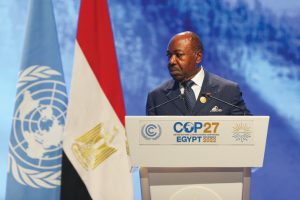BLOOMBERG
Gabon blocked internet access during elections that is likely to see President Ali Bongo extend the 56-year stranglehold his family has had on political power in the oil-producing central African nation.
Live network data show a nation-scale internet blackout across Gabon on election day, Netblocks, an organisation that monitors internet shutdowns, said . Authorities also imposed a nationwide curfew from 7pm to 6am and banned all demonstrations.
The measures were intended to “prevent the spread of calls for violence” and limit the distribution of “false information,” Minister of Communication Rodrigue Mboumba Bissawou said in a televised address.
Bongo’s bid for a third term comes months after Gabon’s constitution was changed to allow the president to be elected in a single round, a move that could favour the incumbent because it splits the opposition vote. The new system also obliges voters to choose their preferred leader and lawmakers from the same party.
Some polling stations in the capital Libreville opened late or not at all. Opposition leader Albert Ondo Ossa said he hadn’t been able to vote as of 1 pm, five hours after polls were scheduled to open.
“I want to exercise my civic duty, but my polling station is still closed,” Ondo Ossa said in a post on his official Facebook page. An official for the national electoral commission didn’t respond to calls seeking comment.
Bongo, 64, is squaring off against 18 competitors. His biggest challenge comes from Ossa, 69, an economics professor and former higher education minister nominated by the opposition coalition known as Alternance 2023.
“Bongo is likely to win comfortably due to his control over the electoral process and the opposition alliance’s high-risk strategy of picking a left-field candidate,” Maja Bovcon, an Africa analyst at Verisk Maplecroft, said in an emailed note.
The vote comes as Gabon seeks to reduce the $22 billion economy’s reliance on oil, which funds more than half of the national budget. The government is betting that selling carbon offsets by preserving its forests can help make up for lost revenue.
“If the president were to change, I’m not convinced that the model has got deep enough roots yet to be fully sustainable,” Lee White, Bongo’s environment minister, said.
Gabon’s abundant oil, timber and manganese supplies haven’t translated into better living standards — one third of its 2.2 million people live below the poverty line, World Bank data show.
Bongo has promised to create more jobs, boost micro-loan programs and cut public school fees. He studied law in France before going into politics and was elected president in 2009, four months after the death of his father, Omar Bongo, who had held power since 1967. He secured a second seven-year term in 2016 elections, defeating opposition leader Jean Ping in the closest election in the nation’s history.
The run-up to the ballot has been calm, but many fear the post-election period could see unrest, similar to the protests that broke out after Bongo’s 2016 victory. The US embassy in Libreville warned of the “possibility of protests throughout Gabon in the lead up to and aftermath” of the elections.
Violence erupted as Bongo won a second seven-year term in 2016, with protesters burning down shops and the parliament building. The government said seven people died in the unrest while the opposition accused the security forces of killing more than 50 of its supporters. Ping is boycotting Saturday’s vote.
Bongo was absent from Gabon in 2018 and 2019 after suffering a stroke while attending a conference.
 The Gulf Time Newspaper One of the finest business newspapers in the UAE brought to you by our professional writers and editors.
The Gulf Time Newspaper One of the finest business newspapers in the UAE brought to you by our professional writers and editors.
